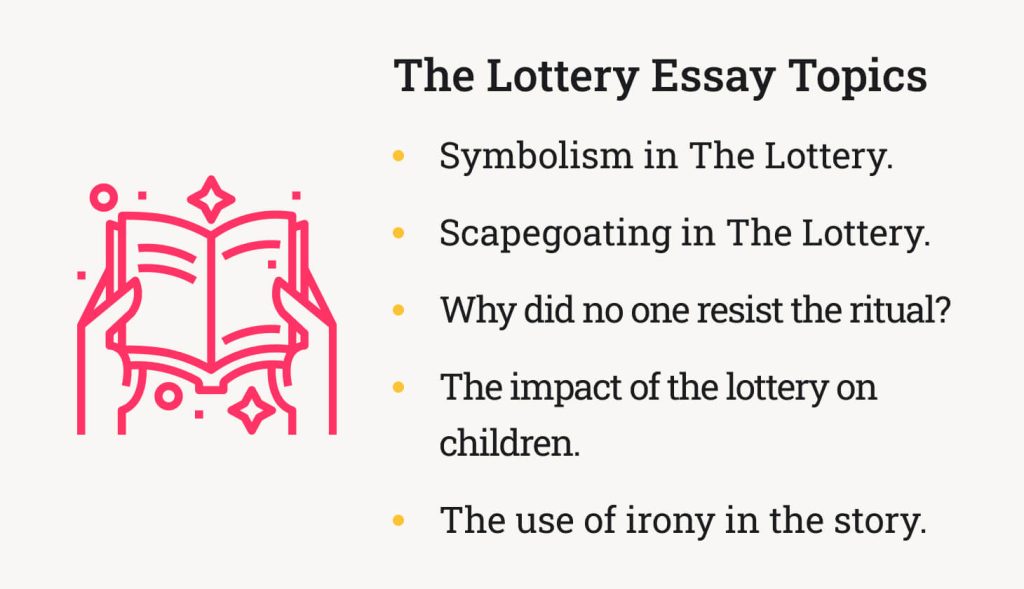169 The Lottery Essay Topics & Questions for Analysis and Argumentative Papers
“The Lottery” is a chilling short story by Shirley Jackson.
Each year, the townspeople gather to hold a lottery. After winning the local lottery, the winners don’t receive any money. Instead, they are stoned to death. Shirley Jackson portrays the brutal and senseless violence lurking beneath the surface of an ordinary small town.
Continue reading this article to find various topic selections and essay prompts. And don’t forget about a bonus at the end: a writing guide for an essay on “The Lottery.”

⭐ Top 12 The Lottery Essay Topics
✏️ the lottery essay prompts.
- 🤔 The Lottery Analysis Essay
- 💡 The Lottery Argumentative Essay
❓ The Lottery Essay Questions
- ✔️ Bonus Essay Topics
- 📋 The Lottery Essay Outline
🔗 References
- The role of tradition in Shirley Jackson’s “The Lottery.”
- The power of groupthink in “The Lottery.”
- Symbolism and foreshadowing in “The Lottery.”
- The use of irony in “The Lottery.”
- The significance of the title in “The Lottery.”
- The relationship between gender and violence in “The Lottery.”
- The theme of blind obedience in “The Lottery.”
- The significance of the black box in “The Lottery.”
- The role of fear in “The Lottery.”
- The importance of setting in “The Lottery.”
- The theme of human nature in “The Lottery.”
- The role of sacrifice in “The Lottery.”

Don’t know where to start your essay on “The Lottery”? The writing prompts below can help you find inspiration for your paper.
Symbolism in The Lottery: Essay Prompt
In Shirley Jackson’s “The Lottery,” symbolism is significant in conveying the story’s themes and underlying messages. Discuss how it is used in the story. Explain how symbolism contributes to the overall meaning of the work.
Consider the following symbols: the black box, the stones, and the lottery itself.
- What do these symbols represent?
- How do they reflect the story’s central themes of tradition, violence, and conformity?
- How does Jackson’s use of symbolism create tension and build toward the story’s shocking conclusion?
Use evidence from the text to support your analysis .
The Lottery Theme: Essay Prompt
In Shirley Jackson’s “The Lottery,” the author explores the theme of blind obedience.
In your essay, provide examples from the text that support this theme. You can use the story’s climax as an illustration. Describe how Tessie’s selection as the sacrificial victim highlights the consequences of mindlessly following authority.
You may also discuss how the story’s message can be applied to real-world situations. You could write about politics, religion, or social norms. Explain how it can serve as a warning to people who are led by society.
Setting of the Lottery: Essay Prompt
In Shirley Jackson’s “The Lottery,” the setting is essential to the story’s meaning. Analyze how it contributes to the overall theme and message.
- Describe how the setting creates a sense of familiarity and unease for the reader. You can also define how it foreshadows the eventual violence and horror of the lottery.
- Consider how the small-town atmosphere, with its traditions and social hierarchies, contributes to the theme. Discuss how the story’s setting reflects the period in which it was written. Write about the social pressures in post-World War II America.
- Explain why the story’s setting resonates with contemporary readers and how it contributes to its impact.
Prompt for Compare and Contrast Essay on The Lottery and The Hunger Games
Shirley Jackson’s “The Lottery” and Suzanne Collins’s “The Hunger Games” explore the theme of ritualized violence. You can compare and contrast the portrayal of this theme in the two texts.
- Consider the similarities and differences between how the societies in each story use ritualized violence.
- Compare the protagonists of each story, Katniss Everdeen and Tessie Hutchinson. Describe how they respond to the violence in their respective societies.
- Discuss how each story uses the theme of ritualized violence to comment on real-world issues, for instance, the effects of societal structures and power dynamics on individual agency.
- Define which story offers a more effective critique of the dangers of ritualized violence in society.
🤔 Topics for The Lottery Analysis Essay
Below, we’ve selected the best Lottery essay topics for your literary analysis paper. Check them out to get inspired!
The Lottery Critical Analysis Essay: Topics
- Symbolism in “The Lottery”: the deeper meaning behind the lottery process.
- The theme of blind adherence to tradition in “The Lottery.”
- The role of violence in “The Lottery” and its impact on the plot.
- The social commentary on conformity and collective psychology in “The Lottery.”
- Psychological effects of the lottery on the characters in Shirley Jackson’s story.
- The role of fear and manipulation in “The Lottery.”
- Analyzing the use of suspense and foreshadowing in the story.
- The theme of sacrifice in “The Lottery” and its implications.
- The concept of scapegoating in “The Lottery.”
- The significance of the black box and its symbolism in “The Lottery.”
- The portrayal of mob mentality and its consequences in “The Lottery.”
- Evaluating the portrayal of community dynamics in the story.
- The ethical implications of withholding information in “The Lottery.”
- The use of irony and its purpose in “The Lottery.”
- Analyzing the role of gender and power dynamics in “The Lottery.”
- Comparing the lottery in “The Lottery” to real-world rituals and traditions.
- The portrayal of power structures and hierarchies in “The Lottery.”
- Analyzing the connection between tradition and progress in “The Lottery.”
- Exploring the historical and cultural context of “The Lottery.”
- The use of setting and atmosphere to enhance the narrative in “The Lottery.”
Topics for The Lottery Character Analysis Essay
- Tessie Hutchinson’s transformation throughout “The Lottery.”
- Old Man Warner: analyzing the role of tradition and fear in shaping his character.
- Mr. Summers: examining the character’s influence and authority within the lottery process.
- Understanding Bill Hutchinson’s motives and actions in relation to the lottery.
- Mrs. Delacroix: analyzing her participation and reaction in the lottery drawing.
- The impact of the lottery on children in the story.
- Mr. Graves’s role as the lottery official and his attitude toward the event.
- Mrs. Adams’s perspective and relationship with the lottery tradition.
- The motivations and decision-making process of the Lottery Committee.
- The Villagers: analyzing the collective mindset and conformity of the community.
- Old Man Warner’s Grandchildren: the potential impact of the lottery on future generations.
- Comparing and contrasting the characters’ reactions to the lottery.
- The portrayal of female characters in “The Lottery” and their role in perpetuating the violence.
- Gender roles and dynamics portrayed in the characters of “The Lottery.”
- The symbolism associated with each character in “The Lottery.”
- The characters’ moral and ethical dilemmas concerning the lottery.
- The characters’ motivations for upholding or questioning the lottery tradition.
- The impact of social pressure and conformity on the characters’ actions in the lottery.
- Analyzing the characters’ perspectives on sacrifice in “The Lottery.”
- Critiquing the absence of empathy and compassion in the characters of “The Lottery.”
The Lottery Literary Analysis Essay: Topics
- The use of symbolism in shaping the characters and themes in “The Lottery.”
- Exploring dramatic irony in the character interactions of “The Lottery.”
- “The Lottery” by Shirley Jackson: literary analysis .
- The role of foreshadowing in developing suspense and tension in the story.
- The use of setting to enhance the atmosphere and mood in “The Lottery.”
- The significance of the black box as a central literary device in the story.
- The use of irony in the characterizations and actions of the villagers.
- Allegory in “The Lottery” and its impact on the interpretation of the characters.
- The use of repetition and ritualistic language in the lottery process and its effect on the characters.
- The contrast between appearance and reality through literary devices in “The Lottery.”
- The role of allusion in deepening the meaning and implications of the characters’ actions.
- The use of suspense and pacing to engage readers and heighten the character development.
- Situational irony in the characters’ acceptance and participation in the lottery.
- Symbolism of Shirley Jackson’s “The Lottery.”
- Dialogue as a literary device revealing the characters’ attitudes and beliefs in “The Lottery.”
- The use of metaphor and simile in describing characters and their actions in “The Lottery.”
- The impact of point of view as a narrative device in “The Lottery.”
- The role of satire and irony in critiquing societal norms and the characters’ adherence to them in “The Lottery.”
- The use of ambiguity and uncertainty in shaping the readers’ perceptions of the characters.
- Irony and paradox in the characters’ motivations and decision-making.
- The role of personification in “The Lottery.”
- Cliffhangers and unresolved situations as the means of suspense in “The Lottery.”
💡 Topics for The Lottery Argumentative Essay
- The portrayal of blind conformity in “The Lottery” as a critique of societal norms.
- “The Lottery” as a powerful allegory for the dangers of tradition and ritualistic behavior.
- The role of the black box in “The Lottery” as a symbol of oppression and control.
- Critiquing the role of the individual in “The Lottery” and the consequences of collective action.
- “The Lottery” as a commentary on the dangers of mob mentality and groupthink.
- The lottery as an instrument of social control and manipulation in “The Lottery”.
- Suspense and tension in “The Lottery” provoke thought and discussion.
- The representation of sacrifice and its ethical implications in “The Lottery.”
- The lottery as a reflection of the dark side of human nature in “The Lottery”.
- The consequences of blindly upholding tradition and its relevance in “The Lottery.”
- The theme of social inequality and discrimination in “The Lottery.”
- The role of fear in perpetuating the lottery tradition in “The Lottery.”
- Arguments for the abolishment of the lottery in the story.
- The lottery as a representation of the human capacity for cruelty and violence.
- The manipulation of fear and the maintenance of control in “The Lottery.”
- The lottery as a reflection of societal values and priorities in “The Lottery”.
- The lottery as a tool for social cohesion and unity in “The Lottery”.
- The portrayal of dehumanization and the loss of individuality in “The Lottery.”
- Critiquing the role of randomness and chance in the lottery drawing in the story.
- The lottery as a symbol of fatalistic thinking and resignation to one’s fate.
- The role of tradition in “The Lottery” and its resistance to change and progress.
- Critically analyzing the villagers’ belief in the lottery and its justification.
- The lottery as a reflection of the human desire for control and dominance.
- The characters’ absence of agency and free will in “The Lottery.”
- Critiquing the portrayal of community and its values in “The Lottery.”
- The lottery as a commentary on the dangers of following traditions without questioning.
- The portrayal of surprise and shock in “The Lottery” and its effects on the characters.
- Lessons about collective responsibility and guilt learned from “The Lottery.”
- The lottery as a reflection of the human tendency to participate in harmful practices.
- The portrayal of sanity and madness in “The Lottery.”
- Critically analyzing the representation of violence and its consequences in “The Lottery.”
- The lottery as a metaphor for the injustices and cruelties in the real world.
- Individual responsibility in a deterministic society as portrayed in “The Lottery.”
- The relevance and significance of “The Lottery” in contemporary society.
- The transformation of Bill Hutchinson’s character from a passive bystander to a victim.
- How does “The Lottery” satirically critique blind adherence to tradition?
- What role does symbolism play in “The Lottery,” and how does it enhance the story’s meaning?
- Is the lottery ritual in the story a representation of mob mentality, and if so, how?
- Does “The Lottery” effectively challenge the concept of a just and fair society?
- How does Shirley Jackson use foreshadowing to build suspense in “The Lottery”?
- What is the meaning of recurring references to food and feasting in the story?
- Is there any significance to the selection of Tessie Hutchinson as the sacrifice in “The Lottery”?
- In what ways does “The Lottery” explore the theme of conformity and its dangers?
- Is the violence depicted in “The Lottery” necessary for the story’s impact, or could it have been portrayed differently?
- What does the ending of “The Lottery” suggest about the human capacity for cruelty?
- How does Shirley Jackson use irony to convey her message in “The Lottery”?
- Is there any redeeming value to the lottery tradition portrayed in the story, or is it solely a negative portrayal?
- Who can be the real audience of “The Lottery,” and how does it affect the understanding of the story?
- Why does no one in the town openly resist the lottery?
- Is “The Lottery” primarily a critique of societal norms or a commentary on human nature?
- What commentary does “The Lottery” make about the arbitrary nature of violence in society?
- Are there any sympathetic characters in “The Lottery,” or are they all complicit in the violent tradition?
- What does “The Lottery” suggest about the cyclical nature of violence and oppression?
- Does “The Lottery” serve as a critique of organized religion and its potential for harm?
- How does the public nature of the lottery in the story influence the characters’ participation?
- Is there any significance to the fact that the lottery tradition has been passed down through generations?
- How does “The Lottery” challenge the notion of the inherent goodness of human beings?
- Is “The Lottery” a commentary on the dehumanizing effects of a strict social hierarchy?
- What is the significance of the date and time of year the lottery takes place in the story?
- How does the fear of punishment influence the characters’ obedience to the lottery tradition?
- Do the characters in “The Lottery” have any agency in their participation, or are they merely victims of tradition?
- Is “The Lottery” an effective critique of the concept of luck and chance in society?
- How does the portrayal of children in “The Lottery” contribute to the story’s tone and message?
- What role do the women in “The Lottery” play in upholding the tradition and perpetuating the violence?
- Is there a deeper meaning to the significance of the stones as the chosen method of execution in “The Lottery”?
- What is the purpose and impact of the seemingly banal conversations and interactions among the characters in the story?
- Does “The Lottery” explore the theme of sacrifice and its relevance to societal structures?
- How does the use of a small-town setting in “The Lottery” contribute to the story’s overall impact?
- Does “The Lottery” suggest that violence and oppression are inherent in human nature, or are they products of societal structures?
- How does the character of Tessie Hutchinson challenge or conform to societal expectations in “The Lottery”?
- Does “The Lottery” critique the role of gender in enforcing and perpetuating harmful societal traditions?
- In what ways does “The Lottery” comment on the dangers of passivity and indifference in the face of injustice?
- How does the portrayal of the lottery tradition in “The Lottery” relate to real-world rituals and customs?
- How do the names of the characters, such as Mr. Summers and Mr. Graves, contribute to the story’s themes and symbolism?
- Why did Jackson decide not to include details about the lottery’s origin and purpose?
✔️ Bonus Essay Topics for The Lottery by Shirley Jackson
- The psychological impact of the lottery on the villagers in Shirley Jackson’s “The Lottery.”
- The historical context of “The Lottery” and its relevance today.
- The paradoxical nature of community in Shirley Jackson’s “The Lottery.”
- The significance of Shirley Jackson’s legacy and her impact on modern horror literature through “The Lottery.”
- The significance of the title “The Lottery” and its connection to fate.
- The use of suspense and surprise endings in Shirley Jackson’s “The Lottery.”
- Shirley Jackson’s personal experiences and how they influenced “The Lottery.”
- The role of tradition in shaping societal norms in “The Lottery” and its relevance today.
- The significance of the date June 27th in “The Lottery.”
- The portrayal of mental illness in “The Lottery” and its societal implications.
- The role of education in challenging societal norms in “The Lottery.”
- The portrayal of masculinity in “The Lottery” and its connection to power dynamics.
- Shirley Jackson’s legacy and influence on modern literature.
- The impact of “The Lottery” on the literary world and its reception at the time of publication.
- The controversy surrounding “The Lottery” and its banning in certain schools and communities.
- The portrayal of the elderly in “The Lottery” and their societal marginalization.
- The theme of sacrifice and its connection to the American Dream in “The Lottery.”
- The role of tradition and ritual in shaping modern society as explored in “The Lottery”.
- The significance of the lottery as a form of entertainment in “The Lottery.”
- The relevance of “The Lottery” in contemporary conformity and social pressure discussions.
📋 The Lottery by Shirley Jackson: Essay Outline
Do you want to write an A+ essay about “The Lottery”? We’ve prepared a writing guide to help you with this task.
The Lottery Essay Introduction
Your introduction should grab the reader’s attention. To do so, you’ll need to start with a hook — it is a statement or question that captures the reader’s interest and makes them want to keep reading. Look at the example:
Hook: Imagine living in a small town where the annual tradition is choosing who would be stoned to death. Would you participate in such a ritual or rebel against it?
After that, you should provide some context for the topic. Background information helps the readers understand what the paper will be about. Here’s an example of how it might look:
Background information: First published in 1948, the story shocked readers with its portrayal of a seemingly idyllic community that engages in a horrific act of violence.
The last sentence of the introduction should be your thesis statement .
Thesis Statement for The Lottery
A thesis statement is a claim or argument that addresses the prompt or topic of an essay. It should be concise and debatable and provide a roadmap for the rest of the paper. A good thesis statement should also reflect the writer’s position. This sentence is supposed to guide the reader’s understanding of the essay’s main point.
Consider “The Lottery” thesis statement example:
Thesis statement: “The Lottery” by Shirley Jackson uses the brutal ritual of a small town’s annual lottery to criticize the dangers of blindly following tradition and highlight the inherent violence and cruelty thriving beneath seemingly peaceful communities.
Essay on The Lottery: Body Paragraphs
When writing body paragraphs, it’s important to focus on one main idea or argument per paragraph.
Each paragraph should start with a topic sentence . It should state the main point and link the paragraph to the previous one. Here’s an example:
Topic sentence: The use of foreshadowing in “The Lottery” creates a sense of unease and tension throughout the story.
A topic sentence is followed by supporting sentences . Each supporting sentence should provide evidence, examples, or analysis to back up the paragraph’s main idea. Use specific details from the story to support your claims and explain how they relate to your argument. Check out this example:
Supporting evidence: From the opening scene, where the villagers gather in the town square, there are hints of something ominous about to happen. The children are gathering stones, and the adults are murmuring uneasily.
The Lottery Essay Conclusion
The conclusion is the final section of an essay that summarizes the main arguments and closes the discussion. To write a good conclusion, restate the thesis statement and summarize the main points. Here’s an example of how a paraphrased thesis might look:
Restated thesis: Shirley Jackson’s “The Lottery” describes the violent tradition of an annual lottery in a small town to critique the ones conforming to traditions while also bringing attention to violence and brutality that may exist in places that look quiet at first sight.
To end a text, you should wrap up the discussion and provide closure for the reader. You can do it by offering a final thought, insight, or a call to action.
It’s important to avoid introducing new information or arguments in a conclusion. It can confuse or frustrate your audience. Instead, focus on bringing the discussion to a satisfying and meaningful end that leaves a lasting impression.
We hope our list of topics and writing guide have been helpful. You can also try our online topic generator to always have fresh ideas for your paper.
- The Lottery: Themes | SparkNotes
- Reading and Discussion Questions on Shirley Jackson’s “The Lottery” | Washington State University
- Study Guide to Shirley Jackson’s “The Lottery” | Kansas State University
- The Lottery Themes | Shmoop
- Analysis of “The Lottery” by Shirley Jackson | ThoughtCo
- “The Lottery” by Shirley Jackson | University of Hawaii
- The Lottery Themes | eNotes
- The Symbolism of Jackson’s “The Lottery” Explained | Interesting Literature
- The Normalization of Violence in “The Lottery” | The University of North Carolina at Chapel Hill
222 Deforestation Topics for Essays, Research Papers, & Speeches
434 depression essay titles & research topics: argumentative, controversial, and more.
The Lottery Essay Questions, Prompts, & Topics
“The Lottery” is one of those stories that can be interpreted in a million different ways. The author brings up many cultural, social, and even political issues for discussion. It is so controversial that the readers were sending hate mails to Jackson!
Did you receive a writing assignment on “The Lottery” by Shirley Jackson? Have no idea where to start? Don’t panic! Sometimes you can find it hard to decide on one topic when there are so many options. This short story also has many Easter eggs to analyze. Custom-Writing.org experts created this list of the best ideas for the essay and “The Lottery” essay questions to help you out!
- 💡 Essay Topics
- ✍️ Writing Prompts
- ❓ Essay Questions
- ✒️ Essay Samples
💡 The Lottery: Essay Topics
Don’t know where to start your essay on “The Lottery” by Shirley Jackson? Check out the prompts to help you write a successful paper!
- Literary analysis essay on “The Lottery” by Shirley Jackson . For this task, you would need to work through the main themes of the story . However, to make it easier, you might want to focus on one topic at a time. For instance, write about the role of tradition and how powerful it can be.
- How are gender roles represented in the story? Look closer to how the roles are divided in this fictional society. There is violence against women, but it doesn’t seem like they are allowed to play victims. Can you catch a glimpse of sexism in some situations? You might as well draw some parallels with the real world.
- How much do traditions affect our lives? “The Lottery” as an example . In this analysis essay on “The Lottery”, you are asked to elaborate on the central theme of the story. Shirley Jackson shows tradition to be so strong and powerful in this society that the rational mind can’t even bring others to reason.
- Social classes in “The Lottery” . Are there any characters in the short story that may seem a bit more privileged than the others? All villagers seem to be in the same boat with equal rights. What about Mr. Summers? His name is on the list, and he draws with everybody else, but doesn’t he have more powers?
- The psychology of the crowd in the short story . You are asked to write an argumentative essay on “The Lottery” by Shirley Jackson. Look for some strong arguments to support the idea. However, there is no need to come up with complicated psychoanalytic theories. Focus on your personal opinion and add some quotes.
- Hidden symbols in Shirley Jackson’s story . Here, it would help if you worked on literary analysis for a little bit. There are some apparent symbols, such as the black box and the stones. But how many more can you find? For example, look at the importance of households and write a symbolism essay on “The Lottery”.
- Investigate the phenomenon of hypocrisy in “The Lottery” . The villagers can be friendly and kind to their neighbors before the ritual begins . However, as soon as they know the results, they immediately turn against “the winner.” Tessie seems like she would do the same, but when she appears to be the chosen one, it doesn’t please her at all.
- Tessie Hutchinson as a scapegoat in “The Lottery” . What can make you think that the main character serves as a scapegoat for the villagers? She might not have a good reputation among them. What do you think drives them to stone her to death? Start a debate on this issue, and don’t forget to use our literature study guide!
- The significance of names in Shirley Jackson’s story . You might have noticed the specifics of the main characters’ names. For instance, Mr. Summers fits perfectly in the setting of a beautiful summer day. Mr. Delacroix, in his turn, carries some hidden religious meaning if you look up the translation. Can you find any other meaningful names?
- What is the central message of “The Lottery”? You might have thought about it after reading the summary of the short story. Well, there is no specific answer because everything depends on your perspective. It may concern social or political issues or whatever you prefer. It is what makes your essay so unique, isn’t it?

✍️ The Lottery Writing Prompts
These “The Lottery” essay prompts will help you find inspiration and overcome the fear of a blank page.
The Lottery Tradition Essay Prompt
- Explain why it’s hard to let go of traditions. Use “The Lottery” by Shirley Jackson to prove your point. In your essay, analyze the quote, “Lottery in June, corn be heavy soon.” Try to find the reasons why people may keep following traditions even when they become redundant.
- Should rituals and traditions exist in the contemporary world? There are still many cases of cruel customs today. For instance, in some African tribes, certain rituals can lead to grave injuries. Examine the tradition in “The Lottery” by Shirley Jackson. Is it morally adequate? Should we ban such traditions or let them remain in certain societies and countries? Share your ideas.
The Lottery Argumentative Essay Prompt
- Why do you think characters in “The Lottery” willingly join the ritual? Tessie doesn’t try to disobey or run despite knowing the cruel outcome. In your paper, study the causes of such behavior.
- Why did Tessie call the ritual “unfair”? At the very end of the story, Tessie is picked by people as a sacrifice. Before that, she complained that nobody had given her a choice during the lottery. In your essay, elucidate her accusations. Present your point of view on whether or not the ritual was just.
The Lottery Point of View Essay Prompt
- What do you think about the narrative style of Jackson’s story? In your paper, scrutinize the literary techniques the author uses. How does it add to the narrative? Use examples from the story to prove your point.
- Could “The Lottery” be told from the first person? How would you change the plot if you were to write it from the POV of one of the characters? Which character is best for that role? Provide answers in your essay.
The Lottery Ending Essay Prompt
- How would you alter the final segment of Jackson’s short story? Did you enjoy it in general? In your essay, review the ending and express your feelings about it. Propose a few alternative ways of finishing the story.
- What is the symbolic meaning of the final segment in “The Lottery”? Why did Shirley Jackson choose that specific way of finishing her story? Try to clarify why the story ends the way it did. What are the reasons behind such a cruel finale? Provide the answer in your essay.
❓ The Lottery Essay Questions
- Was the ritual in Jackson’s story an example of herd behavior?
- Is there a way to bring down the cruel tradition from “The Lottery,” in your opinion?
- What makes people commit cruel and inhumane actions, according to Jackson’s story?
- Is the ritual just an excuse to brutally murder someone?
- What are the central themes of Shirley Jackson’s “The Lottery”?
- What are the symbolic meanings behind objects that villagers use?
- Why did nobody try to stop the ritual, in your opinion?
- Is there gender equality in the society from “The Lottery”?
- How can ideas from this story be implemented in real life?
- What is the role of group and social pressure in rituals?
- Should we follow traditions even if they are redundant, according to “The Lottery”?
- Are there any positive traits of villagers in Jackson’s story?
✒️ The Lottery: Essay Samples
Below you’ll find a collection of “The Lottery” essay examples. You are welcome to use them for inspiration!
- Point of View in “The Lottery” by Shirley Jackson
- The Lottery Analysis: Essay on Shirley Jackson’s Short Story
- The Lottery: Literary Analysis
- Groupthink Notion in “The Lottery” by Shirley Jackson
- Gothic Horror in “The Lottery”
- Foreshadowing in The Lottery by Shirley Jackson
- Crowd Impersonation in “The Lottery” by Shirley Jackson
- Gender Equality in Jackson’s “The Lottery”
- Herd Behavior in “The Lottery” by Shirley Jackson
- Share to Facebook
- Share to LinkedIn
- Share to email

On a warm sunny day, all the villagers gathered to kill their randomly chosen neighbor. They had repeated this ritual for many ages. What forced them to be so cold-hearted and narrow-minded? Why did the first readers of the short story get insulted with the plot? What does Shirley Jackson...

A short summary of “The Lottery” comes down to a description of a pretty violent tradition of one community. Despite a quite optimistic and positive beginning, the reader will soon find out that something feels off about it. The community uses the lottery to pick one person for a sacrifice....

This article by Custom-Writing.org experts contains all the information about the characters in “The Lottery” by Shirley Jackson: Tessie Hutchinson, Bill Hutchinson, Mr. Summers, Old Man Warner, and others. In the first section, you’ll find “The Lottery” character map. ✅ Main Characters in The Lottery by Shirley Jackson Here’s a...

What do the stones symbolize in “The Lottery”? What about the black box? What is its main theme? There are so many questions to attend to about this story, so this article by Custom-Writing.org experts is here to help you out! Apart from discussing the symbolism in “The Lottery”, we...

The Necklace by Guy de Maupassant is a short story, which focuses on the differences between appearance and reality. Here, we’ll talk more about the story, plot, the central conflict, characters, themes, and symbols. In The Necklace study guide, you will also learn about the genre and the author’s message....

Writing an essay can be a challenge, and the very first stage is often the most difficult one. If you need help coming up with an eye-catching essay idea, you’ve come to the right place. Our custom-writing experts have prepared a list of “The Necklace” essay prompts and topics to...

“The Necklace” is one of the most famous short stories that talks about a woman whose dreams of wealth got shattered. The author Guy De Maupassant uses several literary devices, such as metaphors or symbolism, to enhance the reader’s perception. So, what does the necklace symbolize in “The Necklace”? What...

“The Necklace” is an amazing short story with an unexpected twist in the end. It covers multiple topics, such as appearance vs. reality, greed, and societal constrains that can ruin a person’s life. If you’re curious about the themes of “The Necklace,” you’ve come to the right place. Here, our...

In “The Necklace” by Guy De Maupassant, characters are just as important as the plot. They fascinate readers with their actions and motivations. It may be tricky to analyze them, but with our help, you will have no trouble understanding “The Necklace” characters. So, why is Mathilde obsessed with appearances?...

The Necklace is an 1884 short story authored by Guy de Maupassant. It tells readers about Mathilde Loisel, a woman born to a non-rich family who eagerly wishes to live a wealthy life. However, this desire to live beyond her means eventually leads her to tragic consequences. According to Florence...

Welcome to the Sir Gawain and the Green Knight study guide! Here, you will find all the essential information about the poem’s plot and genre. You will also learn about Sir Gawain and the Green Knight story’s characters, themes, and symbols. Sir Gawain and the Green Knight Key Facts Full...

Sir Gawain and the Green Knight is a medieval poem with an exciting plot and many intriguing elements to explore. To write an essay about it, you first need to come up with a good topic. This page can help you find much-needed inspiration. Here, you will find unique Sir Gawain and...

Presentations made painless
- Get Premium
124 The Lottery Essay Topic Ideas & Examples
Inside This Article
The lottery is a popular and controversial topic that has been explored in literature and media for decades. From short stories to novels, movies to TV shows, the concept of the lottery has been used to explore themes of luck, fate, and the darker side of human nature. If you're looking for inspiration for your next essay on the lottery, here are 124 topic ideas and examples to get you started.
- Analyze the symbolism of the black box in Shirley Jackson's "The Lottery."
- Compare and contrast the lottery in "The Lottery" with other dystopian societies in literature.
- Explore the role of tradition in maintaining the lottery in "The Lottery."
- Discuss the theme of scapegoating in "The Lottery."
- Examine the role of gender in the lottery in "The Lottery."
- Investigate the role of the children in the lottery in "The Lottery."
- Analyze the use of irony in "The Lottery."
- Discuss the theme of conformity in "The Lottery."
- Explore the theme of mob mentality in "The Lottery."
- Compare and contrast the lottery in "The Lottery" with real-life lotteries.
- Analyze the role of religion in the lottery in "The Lottery."
- Discuss the theme of tradition vs. progress in "The Lottery."
- Examine the role of fear in maintaining the lottery in "The Lottery."
- Explore the theme of individual vs. community in "The Lottery."
- Analyze the role of the government in the lottery in "The Lottery."
- Discuss the theme of sacrifice in "The Lottery."
- Compare and contrast the lottery in "The Lottery" with other rituals in different cultures.
- Analyze the role of violence in the lottery in "The Lottery."
- Discuss the theme of power in "The Lottery."
- Explore the theme of control in "The Lottery."
- Analyze the role of tradition in maintaining the lottery in "The Lottery" by Shirley Jackson.
- Compare and contrast the lottery in "The Lottery" with other forms of entertainment.
- Discuss the theme of chance in "The Lottery."
- Examine the role of community in the lottery in "The Lottery."
- Analyze the role of fear in the lottery in "The Lottery."
- Explore the theme of rebellion in "The Lottery."
- Discuss the theme of corruption in "The Lottery."
- Compare and contrast the lottery in "The Lottery" with other forms of punishment.
- Analyze the role of tradition in maintaining the lottery in "The Lottery."
- Examine the role of religion in the lottery in "The Lottery."
- Analyze the role of power in the lottery in "The Lottery."
- Discuss the theme of violence in "The Lottery."
- Compare and contrast the lottery in "The Lottery" with other forms of social control.
- Analyze the role of fear in maintaining the lottery in "The Lottery."
- Discuss the theme of individual vs. community in "The Lottery."
- Explore the theme of greed in "The Lottery."
- Discuss the theme of fate in "The Lottery."
- Analyze the role of chance in the lottery in "The Lottery."
Whether you're analyzing the symbolism of the black box or exploring the theme of conformity, there are countless ways to approach the topic of the lottery in your essay. Use these ideas as a starting point to craft a compelling and insightful analysis of this timeless and thought-prov
Want to research companies faster?
Instantly access industry insights
Let PitchGrade do this for me
Leverage powerful AI research capabilities
We will create your text and designs for you. Sit back and relax while we do the work.
Explore More Content
- Privacy Policy
- Terms of Service
© 2024 Pitchgrade
- Comparative Literature Research Topics Topics: 293
- To Build a Fire Essay Topics Topics: 52
- The Road Not Taken Paper Topics Topics: 55
- Tartuffe Topics Topics: 60
- Heart of Darkness Paper Topics Topics: 50
- Beloved Topics Topics: 47
- A Streetcar Named Desire Topics Topics: 49
- Things Fall Apart Paper Topics Topics: 65
- The Chrysanthemums Topics Topics: 50
- Oedipus the King Research Topics Topics: 104
- The Things They Carried Essay Topics Topics: 111
- Beowulf Topics Topics: 107
- The Glass Menagerie Topics Topics: 60
- The Fall of the House of Usher Paper Topics Topics: 50
- The Cask of Amontillado Topics Topics: 65
139 The Lottery Essay Topics
🏆 best essay topics on the lottery, 🎓 interesting the lottery essay topics, 👍 good the lottery research topics & essay examples, 💡 simple the lottery essay ideas, 📌 easy the lottery essay topics, ❓ the lottery essay questions.
- The Lottery Analysis: Essay on Shirley Jackson’s Short Story
- Themes in the Story “The Lottery” by Shirley Jackson
- Psychoanalytic Criticism of “The Lottery” by Shirley Jackson
- “The Lottery” by Shirley Jackson: A More Positive Ending
- The Lottery Short Story: Personal Response
- “Lottery” by Shirley Jackson: Marxist Criticism, Characters, Style, and Tone
- “The Lottery” a Short Story by Shirley Jackson
- Traditions in “The Lottery” by Shirley Jackson “The Lottery” was written by Shirley Jackson in 1948 and contains many notable themes that are significant and relevant to discuss even today.
- The Lottery & The Rocking Horse Winner Compare & Contrast Essay Two authors, Shirley Jackson and David Herbert Lawrence in their short stories The Lottery and The Rocking Horse Winner explore the theme of the dangers of blindly following traditional or cultural norms.
- Herd Behavior in “The Lottery” by Shirley Jackson This paper examines the theme, ironic symbolism, and setting in “The Lottery” by Shirley Jackson and analyzes how the author applies them in the narration.
- Groupthink Notion in “The Lottery” by Shirley Jackson Irving Janis introduced the term “groupthink” to describe behavior. In this paper, the list of symptoms will be applied in order to analyze the situation in Shirley Jackson’s The Lottery.
- Outdated Traditions in “The Lottery” by Shirley Jackson In this essay, the author would like to explore the topic of traditions, especially outdated ones, in the views presented by Shirley Jackson in “The Lottery.”
- Man vs. Society Conflict in ”The Lottery” by S. Jackson The purpose of this paper is to discuss the conflict in “The Lottery” by S. Jackson as that of man vs. society.
- Democracy in The Lottery by Jackson Politics is an essential part of nowadays life. Politics are obligations of a state in regard to society and personality.
- Foreshadowing in The Lottery by Shirley Jackson In “The Lottery and Other Stories,” an example of foreshadowing was the emphasis on how various characters spoke and interacted with one another.
- “The Lottery” by Shirley Jackson: A Story Analysis The rich exploit the poor to become more powerful and wealthy. In The Lottery story by Jackson, Mr. Summer is seen to entice the poor to play the lottery to gain more wealth.
- Tradition in “Everyday Use” by Walker and “The Lottery” by Jackson In Walker’s “Everyday Use”, the theme of tradition is highly defined by the single-family members. In Jackson’s “The Lottery,” the theme of tradition is used to show its brutality.
- Literary Analysis of Jackson’s The Lottery Story In The Lottery, Jackson explores the fundamentals of human nature, questioning whether or not all individuals are capable of violence and cruelty.
- Analysis of “The Lottery” Story by Shirley Jackson The article argues that “The Lottery” demonstrates that despite the moral values people may have, society’s pressure and a sense of impunity can push them to any inhuman act.
- The Lottery Essay: Literary Analysis Example To write an essay on The Lottery by Shirley Jackson can be tricky. ? There are plenty of challenging themes to cover. ♥ So, check our The Lottery essay first!
- Themes of Humanism in Jackson’s “The Lottery” Story Jackson’s “The Lottery” story reveals the themes of humanism, female discrimination, and paganism, emphasizing the changes in human values, beliefs, and attitudes.
- Shirley Jackson “The Lottery”: Criticizing the Concept of Clinging to Traditions Without Understanding The real purpose of Shirley Jackson’s short story, “The Lottery” is to criticize the concept of clinging to traditions without understanding their origins or implications.
- “The Lottery” by Jackson and “The Ones Who Walk Away From Omelas” by Le Guin Analysis of the stories written by Jackson and Le Guin allows one to plunge into the seemingly perfect worlds, where everyone becomes a victim of artificially created morality, and find many common ideas.
- Shirley Jackson’s “The Lottery”: Human Cruelty In “The Lottery” Shirley Jackson reflects on the boundaries and potential of human cruelty, using a stylistic and semantic opposition of the beginning and end of the storyline.
- Analysis of Symbols in “The Lottery” by Shirley Jackson Shirley Jackson’s “The Lottery” is an impressive short novel that narrates the story of an intriguing but cruel tradition in a small village in the United States.
- Shirley Jackson’s The Lottery: Imagery, Foreshadowing, & Symbolism Shirley Jackson’s employment of detailed imagery, foreshadowing, and symbolism has contributed significantly to the masterful nature of “The Lottery.”
- Crowd Impersonation in “The Lottery” by Shirley Jackson Despite the fact that all the characters of Jackson’s “The Lottery” are vivid, great attention is paid to the crowd as a single organism yielding to common ideas and influence.
- Retelling “The Lottery” by Shirley Jackson Shirley Jackson is the author of the short story “The Lottery”. All the citizens of a small village gather in the square between the post office and the bank.
- Similar Theme in “The Lottery” and “The Hunger Games” The lottery in the books “The Lottery” and “The Hunger Games” appears as a symbol designed to demonstrate the problems of outdated but still dominant traditions in societies.
- Shirley Jackson’s Story “The Lottery” Analysis Shirley Jackson’s story “The Lottery” shows many sins committed by humankind for various, not always understandable and explainable reasons.
- Narration in Shirley Jackson’s “The Lottery” Jackson’s “The Lottery” raises a question of the significance of the story behind the text and requires an analysis, as the presented narration is open for interpretation.
- The Meaning of “The Lottery” by Shirley Jackson The story presents a fictional village that conducts the annual ritual “the lottery” on June 27 when the villagers gather together for this tradition.
- Conformity and Individualism in Shirley Jackson’s “The Lottery” and James Baldwin’s “Sonny’s Blues” The paper’s thesis is that “The Lottery” and “Sonny’s Blues” stories reveal the theme of conformity vs. individualism and the universal nature of human suffering.
- Aggression as a Theme in The Lottery by Shirley Jackson The work considers the story that compares commonplace details of current life with a barbaric ceremony known as the "lottery" from the book The Lottery and Other Stories.
- Conformity in Shirley Jackson’s “The Lottery” In the famous short story “The Lottery,” Shirley Jackson implements various literary devices in order to confront the issue of conformity.
- “The Lottery” by Jackson, and “The Rocking-Horse Winner” by Lawrence In two short stories, “The Lottery” by Jackson and “The Rocking-Horse Winner” by Lawrence, the philosophical conflict between luck and its consequences is clearly outlined.
- “The Lottery” and “The Destructors”: Conflict, Characterization and Irony The essay will discuss the main conflicts of “The Lottery” and “The Destructors” stories, their characterization, and themes.
- Condemnation & Violence in Jackson’s “The Lottery” Shields’s article “Arbitrary Condemnation and Sanctioned Violence in Shirley Jackson’s “The Lottery” argues that the concept of capital punishment on a lottery basis is dangerous.
- Tradition as Theme of “The Lottery” by Jackson Tradition is a good thing until it becomes dangerous for people who follow it. It is the central theme of the short story “The Lottery” by Shirley Jackson.
- Manipulation and Distorted Traditions: Analysis of “The Lottery” by Jackson This paper will analyze how the author integrates the elements common to lotteries in the settlement’s tradition to emphasize how easy it is to manipulate the opinion of the masses.
- Tradition in “The Lottery” by Shirley Jackson In Shirley Jackson’s short story “The Lottery,” the author uses the pathological lottery system to symbolize the problems of traditions in modern society.
- “The Lottery” by Jackson vs. “Antigone” by Sophocles Jackson’s short story “The Lottery” describes a tradition in a small town where members draw lottery slips. Sophocles’s play “Antigone” follows one girl’s fight against authority.
- Dangers of Mob Mentality in ”The Lottery” by Shirley Jackson Although the lottery is usually associated with a winner getting a grand prize, in the story, it is a process of selecting a victim for a ritual.
- Narrative & Meaning in Jackson’s “The Lottery” The use of narrative techniques in “The Lottery” is a compelling force of preparing the audience to discern the meaning of the story.
- Gender Equality in Jackson’s “The Lottery” The issue of gender relationships has been widely discussed in the literature, and Jackson’s “The Lottery” is one of the strongest examples of the gender inequality problem.
- The Lottery by Shirley Jackson: Literally Analysis The story “The Lottery” can be perceived ambiguously, seeming cruel. Shirley Jackson masterfully plays with the reader, leaving a lot of understatement.
- Shirley Jackson’s The Lottery Review The Lottery, first published in 1948, remains to be one of the most-read stories in American literature. The story revolves around a small village in New England.
- Analysis of “The Lottery” by Shirley Jackson The paper is designed to conduct a literary analysis of “The Lottery” short story by Shirley Jackson and interpret its symbolic meaning that remains relevant to this day.
- Viciousness in “The Lottery” by Shirley Jackson Shirley Jackson’s “The Lottery” illustrates the height of human potential to execute violence, although, it is depicted as ritual practices, tradition, and community order.
- Symbolism in The Lottery Story by Shirley Jackson The Lottery was written by Shirley Jackson in 1948 and contains many notable themes. The Lottery might be perceived as a short story that contains a considerable number of symbols.
- The Preservation of Humanism Contrary to Tradition in Story “The Lottery” Jackson wrote a stunning contrast between the ordinary and usual quiet life of the village and the shocking tradition, which, however, by force of habit, takes its place.
- Rituals and Human Nature in The Lottery “The Lottery” by Shirley Jackson is a fictional narrative representing rural American culture. One of the most notable themes in the storyline is the power of tradition.
- Blind Tradition: Character Analysis of Jackson’s “The Lottery” and Sophocles’ “Antigone” The characters of “The Lottery” and “Antigone” are having to either follow illogical traditions that are rooted in superstition or a lack of desire to challenge the status quo.
- Themes of Violence in “The Lottery” Story Through what the “Lottery” story depicts, the literary analysis shows the villagers’ inability to draw the line between what is true and what is fiction.
- Marxist Criticism in “The Lottery” by Shirley Jackson In “The Lottery” Shirley Jackson uses the contrast between the ruling class and the working class to illustrate her point about the fight for social change.
- The True Sense of “The Lottery” by Shirley Jackson “The Lottery” symbolizes a human psyche paradox between compassion and violence, which is embodied in the unfair treatment of the unlucky participant.
- Greasy Lake, Lord of the Flies, and The Lottery: Compare & Contrast Human savagery is equally as much a weapon of mass destruction as anthrax, a nuclear weapon. Since the dawn of time, human nature has exuded a persistent vein of unwarranted violence and cruelty.
- “The Lottery” the Short Story by Shirley Jackson The Lottery is the most well-known publication of the author, which she published in 1948. This story portrays the life of a small suburban town in the United States.
- Shirley Jackson’s ‘The Lottery’ Critical Analysis The Lottery is a widely known short story written by Shirley Jackson. The current paper attempts to critically analyze the narrative and discuss the primary topics of the story.
- Character Comparison in “The Lottery” by S.Jackson and “The Rocking-Horse Winner” by D.Lawrence The two stories and real life have many of the same qualities. There are things that cannot be explained or predicted and there are people with unique talents that set them apart from the rest.
- The Inevitability of Choice in “The Lottery” by Shirley Jackson Shirley Jackson introduced a provocative perspective on social relationships, decision-making, and responsibility in her short story “The Lottery.”
- The Lottery Analysis: Story by Shirley Jackson This paper analyses the short story “The Lottery” written by Shirley Jackson. It tells about the lottery in a village, the result of which was the stoning of a “winner” to death.
- The Lottery by Shirley Jackson Review Shirley Jackson gained a reputation as a literary witch. However, already in the “Lottery,” the talent for the depiction of the human soul was revealed.
- Themes of Shirley Jackson’s “The Lottery” Story “The Lottery” is famous for its scapegoat, other ideas baked into its very premises, such as tradition, and human nature, add to the atmosphere, creating a nuanced narrative.
- Analysis of The Lottery, a Story about a Happy Winner The story was published in 1948 in The New Yorker. The population was still trying to recover from World War II, 1939-1945.
- Literary Analysis of Jackson’s “The Lottery” Shirley Jackson’s Lottery is one of the jewels of classic American literature of the twentieth century. This work made a massive contribution to the development of the genre of mysticism.
- Development of the Setting in Shirley’s “The Lottery” and “The Rocking Horse Winner” by Lawrence: From Claustrophobic to Chaotic In “The Lottery” and “The Rocking Horse Winner,” the changes in the setting are defined not by the physical alterations in the environment but by the prism through which they are viewed.
- “The Lottery” the Story by Shirley Jackson In her short story “The Lottery,” Shirley Jackson discusses numerous provocative themes in a controversial and indirect manner.
- Symbol in “The Lottery” Story by Shirley Jackson By using stones as the symbol of violence in “The Lottery,” Jackson represents the subject matter as a social phenomenon, the instances of which are difficult to overcome.
- Shirley Jackson’s Short Story “The Lottery” Literature Analysis Shirley Jackson’s “The Lottery” is a memorable short story that has been called a piece of gothic horror. It is also clearly a piece of social commentary.
- Human Sacrifice vs. Ritual Murder in “The Lottery”, by Shirley Jackson
- General Information About Shirley Jackson’s “The Lottery” Inhumanity Exposed
- Exploring How the Way Shirley Jackson Uses Symbolism in “The Lottery”
- The Deadly Symbolic Presence of Mr. Graves in Shirley Jackson “The Lottery”
- Feminism in “The Yellow Wallpaper”, and Jackson’s “The Lottery”
- Lucky Winner: Irony Shirley Jackson”The Lottery”
- How Does “The Lottery” Explore the Theme of Tradition and Its Dangers
- The Importance of Shirley Jackson’s Insights About Man and Society in “The Lottery”
- How the Authors Bring Out the Theme of Class and Society in Anton Chekhov’s the Bet and Shirley Jackson’ “The Lottery”
- Shirley Jackson’s ‘The Lottery’ and Kate Chopin’s ‘The Story’
- The Link Between Jackson’s “The Lottery” and Obsolete Tradition
- ‘Good’ and ‘Bad’ Tradition in ‘The Lottery’ by Shirley Jackson
- The Destructive Yet Blind Rituals of Mankind in Shirley Jackson’s “The Lottery”
- Shirley Jackson’s “The Lottery” Message of Social Responsibility
- The Irony, Symbolism, and “The Lottery”, by Shirley Jackson
- The Lottery, Its Social Order and Male Superiority Issue
- Similarities and Differences Between “The Lottery” and “Harrison Bergeron”
- The Lottery, Exhibit Sadism and Arbitrary Brutality
- The Importance of Marxist Criticism for Shirley Jacksons ‘The Lottery’
- Similarities Involving Social Ritual and Ceremony in the Hunger Games and “The Lottery”
- Shirley Jackson’s “The Lottery” – Blind Obedience Exposed
- Shirley Jackson’s “The Lottery” Aspects of Human Nature and the Desire for One to Suffer as Long as Everyday Life Continues
- Normalizing Violence and Inhumanity: Shirley Jacksons “The Lottery”
- Individual the Majority and Evil in “The Lottery” by Shirley Jackson
- How Does Shirley Jackson Build Up Suspense in the Short Story “The Lottery”
- Issues With Government Depicted in Golding’s Lord of the Flies and Jackson’s “The Lottery”
- The Conflicts Between Male Authority and Female Resistance in Shirley Jackson’s “The Lottery”
- Shirley Jackson’s ‘The Lottery’: How Tradition Is Skewed
- Symbolism and Genre Conventions of “The Lottery” by Shirley Jackson
- Shirley Jackson’s “The Lottery” and Ursula Le Guin’s the Ones Who Walk Away From Omelas
- The Good and Bad of Human Nature in the Short Story “The Lottery” by Shirley Jackson
- The Human Dignity Motive in the Dystopian Societies in Short Stories “The Lottery” by Shirley Jackson and the Ones
- Who Walk Away From Omelas by Ursula K. Le Guin
- Jackson’s “The Lottery” and Joyce’s “The Dead”
- Shirley Jackson’s “The Lottery” – Evils of Society Exposed
- Analysis and Psychological Aspects of the Short Story “The Lottery”
- Sinister Symbols Within “The Lottery” by Shirley Jackson
- Comparing and Contrasting ‘The Lottery’ and ‘The Ones Who Walk Away From Omelas’
- Plot and Central Idea in Shirley Jackson’s “The Lottery”
- Shirley Jackson’s “The Lottery”: A Compare and Contrast Analysis of the Roles of the Men, Women, and Children
- Individual, the Majority, and Evil in ‘The Lottery’ by Shirley Jackson
- The Cruel and Weak Nature of Humans in the Short Story, “The Lottery” by Shirley Jackson
- Religious and Traditional Symbols in “The Lottery” by Shirley Jackson
- Shirley Jackson’s “The Lottery” and Susan Glaspell’s a Jury of Her Peers: Theme and Gender Roles
- What Is the Irony Found in “The Lottery” by Shirley Jackson?
- How Does Marxist Literary Criticism Relate to Shirley Jackson’s “The Lottery”?
- What Is the Purpose of “The Lottery” by Shirley Jackson?
- What Themes Are Found in “The Lottery” by Shirley Jackson?
- What Is the Main Conflict in Shirley Jackson’s Book “The Lottery”?
- What Made “The Lottery” by Shirley Jackson Stand Out From Earlier Stories?
- What Are Some Questions You Can Raise After Reading “The Lottery” by Shirley Jackson?
- What Are Some Critical Interpretations of “The Lottery” by Shirley Jackson?
- How Is the Short Story “The Lottery” Related to Shirley Jackson?
- What Propaganda Devices Can You Relate to the Short Story “The Lottery”, by Shirley Jackson?
- What Is the Significance of the Setting Found in “The Lottery” by Shirley Jackson?
- Who Is the Speaker Talking To in the Story “The Lottery” by Shirley Jackson?
- How Is the Climax Built in the Short Story “The Lottery” by Shirley Jackson?
- What Is the Significance of the Number 21 in Shirley Jackson’s “The Lottery”?
- What Are Some Examples of Mob Mentality in “The Lottery” by Shirley Jackson?
- What Are the Literary Devices Used in the Short Story “The Lottery” by Shirley Jackson?
- What Is the Name for a Type of Experiment Such as the One Described in “The Lottery”?
- What Are the Similarities and Differences Between “The Lottery” and “Dead Man’s Path”?
- Why People Stand Up for Justice in “The Lottery” by Shirley Jackson?
- How the Conflicts Between Male Authority and Female Resistance in Are Shown in “The Lottery”?
- How Sacrificial Symbolism and Rules Are Imaged in “The Lottery”?
- How Shirley Jackson Uses Imagery in “The Lottery”?
- How Does Shirley Jackson Build Up Suspense in the Short Story “The Lottery”?
- What Parts of the Short Story “The Lottery” Were Deleted From the Movie and Why?
- Who Is the Most Important Character in “The Lottery”?
Cite this post
- Chicago (N-B)
- Chicago (A-D)
StudyCorgi. (2021, September 9). 139 The Lottery Essay Topics. https://studycorgi.com/ideas/the-lottery-essay-topics/
"139 The Lottery Essay Topics." StudyCorgi , 9 Sept. 2021, studycorgi.com/ideas/the-lottery-essay-topics/.
StudyCorgi . (2021) '139 The Lottery Essay Topics'. 9 September.
1. StudyCorgi . "139 The Lottery Essay Topics." September 9, 2021. https://studycorgi.com/ideas/the-lottery-essay-topics/.
Bibliography
StudyCorgi . "139 The Lottery Essay Topics." September 9, 2021. https://studycorgi.com/ideas/the-lottery-essay-topics/.
StudyCorgi . 2021. "139 The Lottery Essay Topics." September 9, 2021. https://studycorgi.com/ideas/the-lottery-essay-topics/.
These essay examples and topics on The Lottery were carefully selected by the StudyCorgi editorial team. They meet our highest standards in terms of grammar, punctuation, style, and fact accuracy. Please ensure you properly reference the materials if you’re using them to write your assignment.
This essay topic collection was updated on November 2, 2024 .
“The Lottery” by Shirley Jackson Essay
The Lottery , a 1948 short story by Shirley Jackson, developed the themes of adherence to meaningless traditions, parenting and scapegoating. The broad aftermath and the negative responses of the readers who did not see the line between fiction and reality prove that the plot of the short story The Lottery by Jackson reflects the real problems of the modern community.
The plot of the story depicts a two hours lottery in a small town which finishes with a ritualistic death ceremony of stoning the unlucky participant as a sacrifice for ensuring a better harvest. At the beginning of the short story, the village children walk around collecting stones.
Mr. Summers who runs the lottery mixes the slips of paper in a black box, checks if everyone is in place and invites the heads of the families to draw the papers. When it clears out that Bill Hutchinson gets the unlucky slip, his wife Tessie starts protesting saying that her husband had not enough time for making his choice and the lottery is not fair.
Then, each member of the Hutchinsons family selects a slip of paper, and Tessie draws a slip with a black dot on it. Then, the villagers throw their stones into Tessie as a part of their death ritual. The fact that Tessie does not question the rite itself, but protests against the choice of her family emphasizes the idea of adherence to tradition as the major theme of the short story.
The rite is regarded as sacred and the idea of doubting it does not occur to anybody. When Mrs. Adams admits that the ritual of the lottery has already been abandoned in other villages, Warner as the eldest man in this community answers that giving up the rite can cause only troubles. “Next thing you know, they’ll be wanting to go back to living in caves” (Jackson 14).
Justifying the death ritual with the fact that the lottery has been always held in the village previously, Jackson discloses the theme of parenting when in one of the final episodes, a woman puts a stone into a child’s hand, fostering the tradition of violence and lotteries searching for the scapegoats to be stoned.
Regardless of the indignation raising in the readers’ minds, after decoding the symbolic meaning of the depicted lottery rite, everyone can recollect the situations from personal experience and world’s history in which modern the community selects a scapegoat to be discriminated.
For instance, the Nazis scapegoated the Jewish people, proclaiming them the reason of their troubles. Regardless of the current societal progress, modern people frequently scapegoat sexual and ethnical minorities, blaming them for the current moral decay and other social problems. The social phenomenon of scapegoating is rooted deep in public consciousness and tradition according to which the dominating social group looks for the opportunities of self-affirmation and shifting the responsibility for their problems on the others.
Though the ritual of stoning to death has certain historical basis, its meaning is rather symbolical and should not be taken literally by modern readers. The examples of scapegoating the others, including the limited rights of immigrants for finding a good job and the so-called glass ceiling due to which women receive lower salaries than men doing the same job and have lower chances for career promotion clearly represent the phenomenon of scapegoating in modern community.
In other words, appealing to the readers’ feelings, Shirley Jackson provides them with food for thought not limited to the indignation with the medieval rite, but extended to the reappraisal of their own attitudes and behavior.
The aftermath of The Lottery and the readers’ reaction to the short story proves that its plot impressed the readers recognizing it as the reflection of their lives.
After the short story was published in The New Yorker in 1948, the author received hundreds of hostile letters from the readers objecting to the brutal ending of the story. “As Jackson noted in her witty essay Biography of a Story , many of the letters she received that summer were from people who wanted to know whether these lotteries are held and whether they could go there and watch” (Murphy 104).
The debates concerning the actual location of these rites prove that the line between the fiction and reality as perceived by the readers appeared to be unclear. Hypocritically concealing their fear of becoming a scapegoat, not feeling empathy with Tessie Hutchinson who becomes a victim and not having moral strength and common sense to abandon the meaningless rite, the characters of the short story have a strong resemblance to modern readers.
“The contradictions of myth and ideology, the imaginary solutions to real problems, emerge in the specific rituals that ostensibly endorse the myth and ideology” (Hattenhauer 44). Thus, the plot of the short story can be regarded as the exaggerated reflection of the phenomenon of scapegoating as the imaginary solution to the real problems of the modern community.
The readers’ reaction to the short story The Lottery which became the classic of American literature proves that the depicted phenomenon of scapegoating appeals to their feelings as a topical problem of the modern community.
Works Cited
Hattenhauer, Darryl. Shirley Jackson’s American Gothic. State University of New York Press, 2003. Print.
Jackson, Shirley. The Lottery . Mankato: Creative Education, 2008. Print.
Murphy, Bernice. Shirley Jackson: Essays on the Literary Legacy. Jefferson: McFarland & Company Publishers. Print.
- Henry David Thoreau: A Challenge to Become Better
- The two views of the Mississippi
- Traditions in "The Lottery" by Shirley Jackson
- Gender Issues in the Movie “The Stoning of Soraya M.”
- Lottery Wars in American Society
- Theme Analysis: The Grapes of Wrath
- Tea Cake and Janie in Their Eyes Were Watching God – an Integral Character
- Reflection Paper: “The Death of the West”
- Innocence and Experience in Joyce, Kincaid, and Frost
- American Dream: "Fences” by August Wilson
- Chicago (A-D)
- Chicago (N-B)
IvyPanda. (2018, October 12). "The Lottery" by Shirley Jackson. https://ivypanda.com/essays/the-lottery/
""The Lottery" by Shirley Jackson." IvyPanda , 12 Oct. 2018, ivypanda.com/essays/the-lottery/.
IvyPanda . (2018) '"The Lottery" by Shirley Jackson'. 12 October.
IvyPanda . 2018. ""The Lottery" by Shirley Jackson." October 12, 2018. https://ivypanda.com/essays/the-lottery/.
1. IvyPanda . ""The Lottery" by Shirley Jackson." October 12, 2018. https://ivypanda.com/essays/the-lottery/.
Bibliography
IvyPanda . ""The Lottery" by Shirley Jackson." October 12, 2018. https://ivypanda.com/essays/the-lottery/.
- To find inspiration for your paper and overcome writer’s block
- As a source of information (ensure proper referencing)
- As a template for you assignment
45 pages • 1 hour read
The Lottery
A modern alternative to SparkNotes and CliffsNotes, SuperSummary offers high-quality Study Guides with detailed chapter summaries and analysis of major themes, characters, and more. For select classroom titles, we also provide Teaching Guides with discussion and quiz questions to prompt student engagement.
Story Analysis
Character Analysis
Symbols & Motifs
Literary Devices
Important Quotes
Essay Topics
Discussion Questions
How does the author create a feeling of suspense or dread? Give examples.
The Lottery offended many readers on its first publication. Explain why the story was controversial. Do you agree? If yes, explain why. If not, defend the story with a rebuttal .
Little Davy Hutchinson receives a small handful of stones . Why? Given the purpose of the lottery, was this a proper thing to do? Defend your view.
Are small towns more or less likely than other places to succumb to group-think cruelty? Explain.
How does Jackson use foreshadowing throughout the story to suggest its brutal ending?
Jackson presents Tessie Hutchinson with no choice at the end of the story. Write an alternative ending for Tessie, and describe how a different ending might affect her life and her family.
Name a practice from the past that was considered normal but is shunned today. How does society determine what is acceptable, and how does this change over time?

Plus, gain access to 8,600+ more expert-written Study Guides.
Including features:
Related Titles
By Shirley Jackson

The Haunting Of Hill House

The Possibility of Evil

We Have Always Lived in the Castle

Featured Collections
American Literature
View Collection
Books on Justice & Injustice
Horror, Thrillers, & Suspense
Safety & Danger
Science Fiction & Dystopian Fiction

Improve your Grades
The Lottery Essay | Essay on the Lottery for Students and Children in English
February 07, 2024 by Prasanna
The Lottery Essay: “The Lottery” is a short story of an unusual town that is bounded by the always following traditions. This story consists of a theme. There are various connections to the theme made by the author.
The story is based on an American setting. This story questions tradition. It questions the relationship between civilization and violence.
You can also find more Essay Writing articles on events, persons, sports, technology and many more.
Long and Short Essays on the Lottery for Students and Kids in English
We are providing the students with essay samples of a long essay of 500 words in English and a short essay of 150 words in English for reference.
Long Essay on the Lottery 500 Words in English
Long Essay on the Lottery is usually given to classes 7, 8, 9, and 10.
The story is based on an American setting and has been written by Shirley Hardy Jackson in the year 1948. It is about a town that has been caught up in a trap of a tradition that is being followed from a very long time.
The tone and setting of “The Lottery” are the important aspects of the story. At the beginning of the story, Jackson very specifically describes the setting. In the beginning, she talks about the 27th of June, which was a clear and sunny day. The day beamed with freshness and warmth, just like a normal summer day with normal people doing their daily work. The writer gives a very misleading beginning to the story, by describing it as a new beginning for a very normal town. But this is not the case. Later on in the story, it takes a turn, and it is rather an end and not a beginning. It is a day of lottery in the town resided by only 300 people. The lottery is run by Mr Summers, who along with Mr Graves the postmaster brings a black box at the setting.
Mr Warner was the oldest man in the town and had participated in seventy lotteries presenting the tradition of lottery in the town. In the current setting, a new black box has been used by Mr Summers because the old traditional one used by Mr Warner had become shabby. No one in the village wanted to fool around with the traditions, but Mr Summers did.
Mr Warner feels that the lottery is the only thing that had kept the town stable. According to him, the only way to ensure good crops is human sacrifice. This short story mainly aims at highlighting the fact that following traditions blindly can be dangerous. The reader shows the bizarre level of superstition through the ritual of murdering innocent people just for the sake of tradition. This story shows an innocent being stoned to death just to fulfil traditional beliefs and happenings and making a sacrifice to nature and the harvest.
There are two main symbols in the story, Mr Warner and the black box. Both symbols give a sense of tradition to their readers. Mr Warner did not want to stop the traditional lottery, and the black box was just a mere symbol of tradition. The story consists of a traditional plot structure and has narrative elements like back story and foreshadowing. This story shows how some traditions are not worth continuing. Death of a fellow human just for the sake of extra corn is not worth taking place.
The story begins by lulling the readers into a false sense of calm, showing the present-day connotations of winning a lottery and then finally striking with the harsh reality, where the prize of the lottery was death. Following traditions is a good thing but to a certain extent. It is good to keep past beliefs alive, but not at the sake of taking a person’s life.
Short Essay on the Lottery 150 Words in English
Short Essay on the Lottery is usually given to classes 1, 2, 3, 4, 5, and 6.
“The Lottery” is a famous short story written by Shirley Jackson. In this story, the individuals are vulnerable to persecution by a group. The annual lottery breaks down the relationships and bonding of the families and communities with the town and builds them back again.
Just to serve the previous traditions, an innocent is killed to satisfy nature for a good yield of crops. Justifying the death ritual and considering it as a sacred act is wrong. The lottery has been taking place since the past seventy years with Mr Warner being one of the oldest men in the town.
The theme of parenting in this story is also heart-wrenching when a woman puts a stone on a child’s hand. Fostering the traditions of violence and ultimately killing scapegoats by stoning them for good crop yield. Bounded by tradition, the town had lost its feelings and emotions. Selfishness overpowered the people leading to the murder of an innocent, awarding the winner with the garland of death.
10 Lines on the Lottery in English
- Shirley Jackson is best known for her short story “The Lottery”.
- The writer had influenced Stephen King by the story.
- The lottery was published in the New Yorker.
- Shirley Jackson was a housewife as well as a writer.
- Shirley Jackson’s husband was a noted Jazz and literary critic.
- “The Lottery” created immense controversy.
- The short story has been adapted for theatre, television and even ballet.
- Jackson got a lot of hate mail for her short story.
- Shirley Jackson lived in North Bennington, in Vermont.
- Ruth Franklin had written a biography about Jackson.
FAQ’s on the Lottery Essay
Question 1. Name two themes of The Lottery.
Answer: Human nature and the power of traditions are the two themes of The Lottery.
Question 2. When was the lottery conducted in the story?
Answer: It was conducted on the 27th of June where the entire community gathered in the time square.
Question 3. Write is the moral lesson of the story.
Answer: The moral lesson is, if something has been done traditionally, it does not mean it has to be continued. The lottery rightly mentions the dangers that lie ahead of following traditions blindly.
Question 4. What is the representation of the black box in the story?
Answer: The black box represents a symbol of tradition and illogical loyalty of the villagers.
- Picture Dictionary
- English Speech
- English Slogans
- English Letter Writing
- English Essay Writing
- English Textbook Answers
- Types of Certificates
- ICSE Solutions
- Selina ICSE Solutions
- ML Aggarwal Solutions
- HSSLive Plus One
- HSSLive Plus Two
- Kerala SSLC
- Distance Education

IMAGES
VIDEO
COMMENTS
Are you still dissatisfied with your essay because it does not make enough of an impression? Try looking at our The Lottery essay titles! 🏆 Best The Lottery Essay Prompts & Examples. Shirley Jackson’s “The Lottery”: Elements of the Story
Searching for The Lottery essay topics? 👉 Check out our list of ideas for The Lottery analysis essay and argumentative paper. You’ll also find prompts & outline.
Check out this list of Shirley Jackson's The Lottery essay questions & topics! In addition, you will find here a collection of paper examples and The Lottery writing prompts.
If you're looking for inspiration for your next essay on the lottery, here are 124 topic ideas and examples to get you started. Analyze the symbolism of the black box in Shirley Jackson's "The Lottery." Compare and contrast the lottery in "The Lottery" with other dystopian societies in literature.
Looking for the best The Lottery topic for your essay or research? 💡 StudyCorgi has plenty of fresh and unique titles available for free. 👍 Check out this page!
In “The Lottery” Shirley Jackson raises several urgent and severe societal topics – the search for a scapegoat, herd feeling, and blind adherence to traditions.
The Lottery, a 1948 short story by Shirley Jackson, developed the themes of adherence to meaningless traditions, parenting and scapegoating. The Lottery by Jackson reflects the real problems of the modern community.
Get ready to explore The Lottery and its meaning. Our full analysis and study guide provides an even deeper dive with character analysis and quotes explained to help you discover the complexity and beauty of this book.
Free essay examples about The Lottery ️ Proficient writing team ️ High-quality of every essay ️ Largest database of free samples on PapersOwl
“The Lottery” is a famous short story written by Shirley Jackson. In this story, the individuals are vulnerable to persecution by a group. The annual lottery breaks down the relationships and bonding of the families and communities with the town and builds them back again.